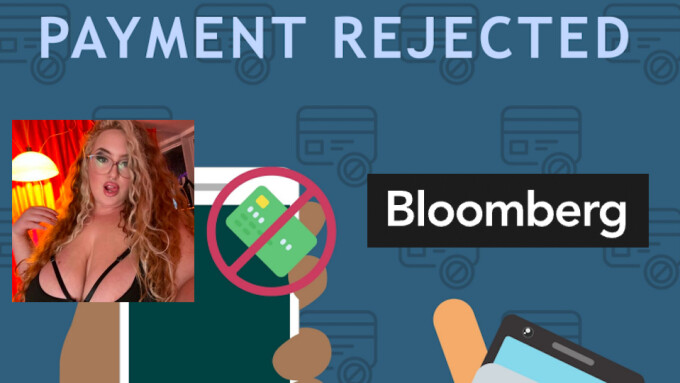NEW YORK — Bloomberg published a report today documenting how adult performers and content creators have become “collateral damage” in an ongoing campaign to make online platforms liable for user-generated content.
The article, written by Allison Nicole Smith, features testimony from performers Gwen Adora and Alana Evans; scholars Angela Jones, Kendra Albert and Eric Goldman; industry attorney Corey Silverstein; and Free Speech Coalition Executive Director Alison Boden.
Smith quotes a 2019 survey of adult content makers by the Center for LGBTQ Economic Advancement & Research, which found that almost half of respondents had their accounts closed or denied by national banks and one third were told their accounts had been closed for terms and conditions of service violations.
“It's occupational discrimination,” APAG union president Alana Evans told Smith. “If you don't have access to banks, you can't build credit. You can't invest. It's harder to get a lease or insurance. At any moment, we can lose access to everything.”
Several performers told Smith that their livelihoods had been jeopardized “from the fallout of efforts to stop child exploitation and sex trafficking — both of which are widespread online. They have also been the target of conservative groups that oppose online pornography in general.”
A Chilling Effect
The article covers how strategies such as lawsuits against MindGeek and invocations of the controversial Section 230 carve-out FOSTA have been used to chill online speech.
“Before FOSTA, claims against an online platform based on user-uploaded content would almost always be barred by Section 230 of the CDA,” Smith explains, referencing the Communications Decency Act of 1996. She also cites attorney Corey Silverstein, who noted that since 2018 when Donald Trump signed FOSTA — a law drafted by religious anti-sex-work Republicans in the Midwest and later adopted by politicians from both parties — lawsuits have been able to “drown online platforms and cause them to ultimately censor protected speech.”
FSC’s Alison Boden told Smith that an Orange County Republican judge’s ruling endorsing liability for Visa over Pornhub transactions “turbocharged” what she called “a chilling effect across the entire adult industry.”
Kendra Albert, a technology lawyer at Harvard Law School's Cyberlaw Clinic, said, “Even if Visa isn't found liable in the end, this lawsuit already has and will change how credit card companies interact with adult industries. I suspect that's the point of the litigation in the first place.”
NCOSE Endorses Financial Deplatforming of Sex Workers
Smith also interviewed NCOSE Vice President Haley McNamara, an anti-porn crusader who defended the financial deplatforming of sex workers as “a pressure point on pornography companies to realize that now is the time to embrace common-sense safety standards instead of fighting them.”
NCOSE’s battle to eradicate pornography has targeted, at various times since 1961, 18th century novels about sex work, any mention of LGBTQ+ sexualities, and Sports Illustrated and Cosmopolitan magazines.
Anti-MindGeek lawyers Michael Bowe and Lauren Tabaksblat, from the New York law firm Brown Rudnick, were also contacted by Smith. Bowe — who has represented Donald Trump, Jerry Falwell, Jr. and several other GOP-aligned clients, and has ties with NCOSE and Exodus Cry spokesperson and anti-porn activist Laila Mickelwait — and his colleague provided a statement claiming that their “goal is not to get rid of the pornographic and commercial sex industry."
To read “How Sex Workers Are Caught in the Middle of Legal Fight Against Online Trafficking,” visit “How Sex Workers Are Caught in Middle of Legal Fight Against Online Trafficking,” visit Bloomberg.com.








